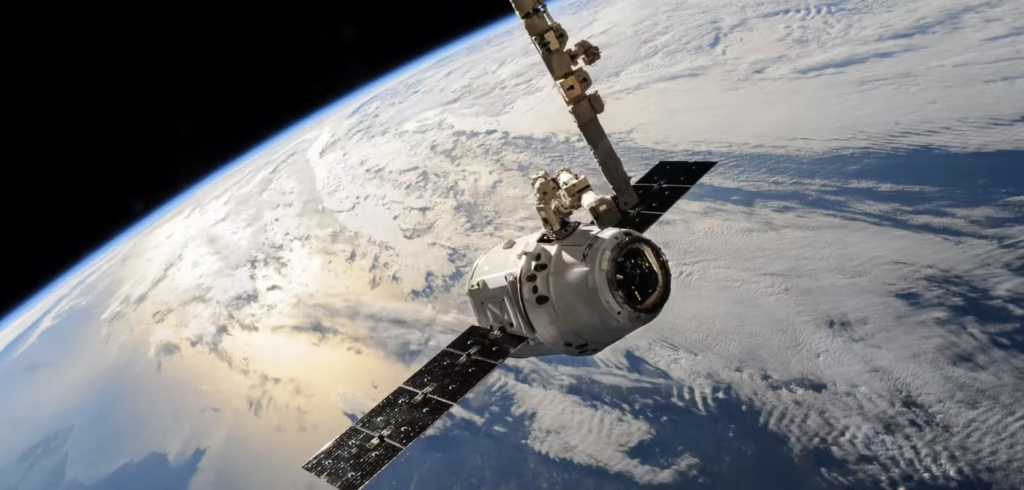When the African Space Agency officially opened in April, it marked the first time spacefaring countries across the continent, including Egypt, Nigeria, and South Africa, came together under one banner. For space scientist Temidayo Oniosun, founder of the think tank Space in Africa, this was not the beginning of Africa’s journey into space. As he put it, “Space is nothing new in Africa.”
Oniosun explained that during the 1960s space race, African countries played a behind-the-scenes role in the Apollo moon missions. They hosted key infrastructure that ensured the missions’ success. “The missions wouldn’t have been possible,” he said, without Africa’s support. Yet, the continent’s contribution went largely unrecognized.
“When America sent [NASA astronaut] Neil Armstrong to the moon, it wasn’t like, ‘This is good for America, and we thank Africa and other regions for their contribution.’ But Africa played a role in that.”
Temidayo Oniosun
Today, Africa is no longer just hosting infrastructure but also designing, building, and launching satellites. This represents a decisive shift in space technology in Africa, which is being developed with a focus on the continent’s own needs.
Oniosun emphasized that in Africa, “space is a means to an end.” Unlike other nations aiming for the moon or Mars, African priorities are more immediate.
“They’re thinking, ‘I can use this satellite to provide connectivity to my village. I’ve got flooding issues, drought issues, my farm is not yielding, and I can use this satellite data to improve that.’”
Temidayo Oniosun
While satellite data is widely available, Africa faces unique challenges tied to its equatorial geography. European or Asian programs often fail to fully address these specific conditions. That is where African innovation comes in.
Olugbenga Olumodimu, a space program manager at the University of Portsmouth, described African space science as “very niche.” He explained, “If I try to replicate [what I do here] in Africa, it is not going to work. So, I have to learn the physics of the equator.”
This includes designing satellites positioned at particular angles or instruments suited to regional data. For instance, solar storms can affect regions differently. In northern latitudes, they are seen as threats to radio signals, while in Nigeria, they are considered dangerous to petroleum pipelines, a cornerstone of the country’s hydrocarbon economy.
By sharing data across borders, scientists get a fuller picture of these global threats. “If parts of the Earth are not sufficiently covered like other places, then the science is not complete,” Olumodimu explained. Collaboration, he said, is vital to “make the science effective.”
Plans are already in motion for a joint satellite that will track space-weather effects across multiple latitudes simultaneously. “When we have that sort of data, it is easier to do what we call global science,” Olumodimu added.
South Africa’s military has also engaged in space-weather monitoring, sharing its data with the European Space Agency, which makes it available for global use. “Such services usually go on for decades,” noted ESA’s Africa expert, Thomas Weissenberg. He warned that a severe solar storm could “hit satellites and simply destroy them. It could be the end of many Earth Observation satellites, communication satellites, Starlink, and so on.”

Africa And Europe Strengthen Space Partnership
Europe and Africa have been cooperating on space projects for three decades. In January 2025, the European Commission reaffirmed its commitment to a €100 million ($117 million) Africa-EU Space Partnership Programme.
“[Our partnership] has gotten more intensive, especially in the past five to eight years, due to developments in Africa and in Europe as well. Geopolitical reasons might play a role as well,” Weissenberg noted.
The launch of the African Space Agency (AfSA) in Cairo this year may prove a turning point. AfSA’s goal is to unite the continent by fostering shared infrastructure, joint projects, and open data exchange. “You’ve got countries like Egypt, Nigeria, Algeria, and South Africa — some of their national space programs are more than two decades old,” Oniosun observed.
“Then you’ve got relatively young space programs — the Kenyan Space Agency was founded in 2017, Ethiopia, and Rwanda. Countries like that are at a different level. Now, everybody is talking with each other.”
Temidayo Oniosun
Africa’s space journey, once overlooked, is now being written by Africans themselves, with implications that extend far beyond the continent.
READ ALSO: IMANI PULSE Reveals Rising Discontent With NDC Rule





















